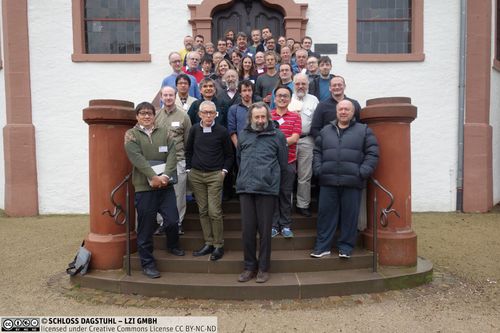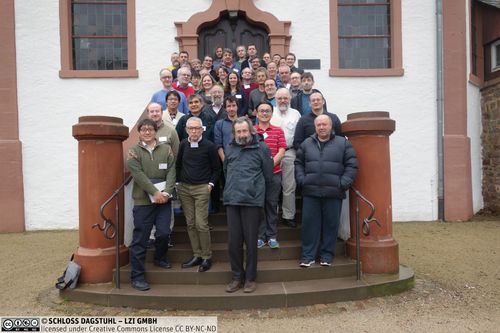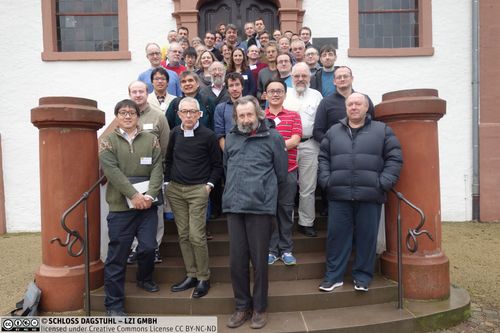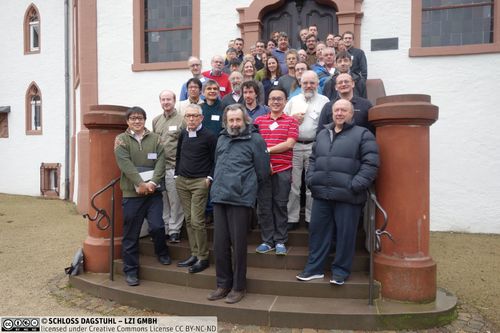Dagstuhl Seminar 17081
Computability Theory
( Feb 19 – Feb 24, 2017 )
Permalink
Organizers
- Klaus Ambos-Spies (Universität Heidelberg, DE)
- Vasco Brattka (Universität der Bundeswehr - München, DE)
- Rodney Downey (Victoria University - Wellington, NZ)
- Steffen Lempp (University of Wisconsin - Madison, US)
Contact
- Andreas Dolzmann (for scientific matters)
- Annette Beyer (for administrative matters)
Impacts
- A Friedberg enumeration of equivalence structures : article - Downey, Rodney Graham; Melnikov, Alexander; Ng, Keng Meng - Singapore : World Scientific, 2017. - 28 pp. - (Journal of Mathematical Logic ; 17. 2017, 2).
- A hierarchy of computably enumerable degrees - Downey, Rodney Graham; Greenberg, Noam - Cambridge : Cambridge University Press, 2018. - pp. 53-89 - (The bulletin of symbolic logic ; 24. 2018, 1).
- Dimension 1 sequences are close to randoms - Greenberg, Noam; Miller, Joseph S.; Shen, Alexander; Westrick, Linda Brown - Amsterdam : Elsevier, 2018. - pp. 99-112 - (Theoretical computer science ; 705. 2018).
- Lowness and logical depth - Downey, Rodney Graham; MacInerney, Michael; Ng, Keng Meng - Amsterdam : Elsevier, 2017. - pp. 23-3 - (Theoretical computer science ; 702. 2017).
- On a question of Kalimullin - Downey, Rodney Graham; Igusa, Gregory; Melnikov, Alexander - - Providence : American Mathematical Society, 2018. - 11 pp. - (Proceedings of the American Mathematical Society ; 2018).
- On Low for Speed Oracles : article in 35th Symposium on Theoretical Aspects of Computer Science - Bienvenu, Laurent; Downey, Rodney Graham - Wadern : LZI, 2018 - (LIPICS : 96 : article).
Schedule
Computability is one of the fundamental notions of mathematics and computer science, trying to capture the effective content of mathematics and ist applications. Computability Theory explores the frontiers and limits of effectiveness and algorithmic methods. It has its origins in Gödel's Incompleteness Theorems and the formalization of computability by Turing and others, which later led to the emergence of computer science as we know it today. Computability Theory is strongly connected to other areas of mathematics and theoretical computer science. The core of this theory is the analysis of relative computability and the induced degrees of unsolvability; its applications are mainly to Kolmogorov complexity and randomness as well as mathematical logic, analysis and algebra. Current research in computability theory stresses these applications and focuses on algorithmic randomness, computable analysis, computable model theory, and reverse mathematics (proof theory). Recent advances in these research directions have revealed some deep interactions not only among these areas but also with the core parts of computability theory. The goal of this Dagstuhl Seminar is to bring together researchers from all parts of computability theory and related areas in order to discuss advances in the individual areas and the interactions among those.
 Klaus Ambos-Spies and Rodney Downey
Klaus Ambos-Spies and Rodney Downey
Computability theory grew from work to understand effectiveness in mathematics. Sophisticated tools have been developed towards this task. For a while, the area tended to be concerned with internal considerations such as the structure of the various hierarchies developed for the tasks of calibrations. More recently, this machinery has seen modern applications into areas such as model theory, algorithmic randomness, analysis, ergodic theory, number theory and the like; and the tools have been used to answer several classical questions. Seminar 17081 was an opportunity for researchers in several areas of modern computability theory to get together and interact.
The format was for 2-3 lectures in the morning with at least one being an overview, and a similar number of 3-4 in the afternoon, with Wednesday afternoon and Friday afternoon free. The weather being miserable, participants opted to stay at the Schloss Wednesday afternoon, and quite a bit of work was done in pairs in the time left free, on the Wednesday afternoon in particular. At least one problem seen as significant in the area was solved (one concerning the strength of Ramsey's Theorem for Pairs in reverse mathematics), and the organizers know of several other papers in preparation resulting from the seminar.
The lectures were from various areas, but the greatest concentration was around
- classification tools in computable analysis (the Weihrauch Lattice) and Reverse Mathematics (on what proof-theoretic strength is needed to establish results in mathematics), and these areas' relationship with generating algorithms, such as in proof mining;
- computable model theory (looking at structures such as groups, rings, or abstract algebraic structures, endowing them with effectivity and seeing what else is algorithmic). Notable was the new work on effective uncountable structures such as uncountable free groups, and on topological groups;
- algorithmic randomness: Here one seeks to give meaning to randomness for individual strings and infinite sequences. Talks given explored the relationship of calibrations of randomness to computational power, and online notions of randomness.
Of course, these are not separate areas but are inter-related, and the talks reflected these inter-relationships.
Currently, computability theory is quite vibrant with many new applications being found, and a number of young and talented researchers entering the field. This was reflected in the age of the presenters of many of the lectures, as well as the significant number of people we could have invited in addition.
All in all, the meeting was a great success and should have significant impact on the development of the area.
 Klaus Ambos-Spies, Vasco Brattka, Rodney Downey, and Steffen Lempp
Klaus Ambos-Spies, Vasco Brattka, Rodney Downey, and Steffen Lempp
- Klaus Ambos-Spies (Universität Heidelberg, DE) [dblp]
- George Barmpalias (Victoria University - Wellington, NZ) [dblp]
- Laurent Bienvenu (University of Montpellier & CNRS, FR) [dblp]
- Vasco Brattka (Universität der Bundeswehr - München, DE) [dblp]
- Peter Cholak (University of Notre Dame, US) [dblp]
- Chitat Chong (National University of Singapore, SG) [dblp]
- Barbara Csima (University of Waterloo, CA) [dblp]
- Rodney Downey (Victoria University - Wellington, NZ) [dblp]
- Willem L. Fouché (UNISA - Pretoria, ZA) [dblp]
- Sergey Goncharov (Sobolev Institute of Mathematics - Novosibirsk, RU) [dblp]
- Noam Greenberg (Victoria University - Wellington, NZ) [dblp]
- Rupert Hölzl (Universität der Bundeswehr - München, DE) [dblp]
- Iskander Shagitovich Kalimullin (Kazan Federal University, RU) [dblp]
- Takayuki Kihara (University of California - Berkeley, US) [dblp]
- Julia Knight (University of Notre Dame, US) [dblp]
- Ulrich Kohlenbach (TU Darmstadt, DE) [dblp]
- Steffen Lempp (University of Wisconsin - Madison, US) [dblp]
- Alberto Marcone (University of Udine, IT) [dblp]
- Alexander Melnikov (Massey University, NZ) [dblp]
- Wolfgang Merkle (Universität Heidelberg, DE) [dblp]
- Joseph S. Miller (University of Wisconsin - Madison, US) [dblp]
- Russell G. Miller (CUNY Queens College - New York, US) [dblp]
- Kenshi Miyabe (Meiji University - Kawasaki, JP) [dblp]
- Antonio Montalbán (University of California - Berkeley, US) [dblp]
- Keng Meng Ng (Nanyang TU - Singapore, SG) [dblp]
- André Otfrid Nies (University of Auckland, NZ) [dblp]
- Arno Pauly (Free University of Brussels, BE) [dblp]
- Alexander Shen (University of Montpellier & CNRS, FR) [dblp]
- Richard A. Shore (Cornell University, US) [dblp]
- Theodore A. Slaman (University of California - Berkeley, US) [dblp]
- Andrea Sorbi (University of Siena, IT) [dblp]
- Mariya I. Soskova (University of Sofia, BG) [dblp]
- Sebastiaan A. Terwijn (Radboud University Nijmegen, NL) [dblp]
- Henry Towsner (University of Pennsylvania - Philadelphia, US) [dblp]
- Daniel Turetsky (Victoria University - Wellington, NZ) [dblp]
- Nikolay K. Vereshchagin (Moscow State University, RU & National Research University Higher School of Economics - Moscow, RU) [dblp]
- Wei Wang (Sun Yat-sen University - Guangzhou, CN) [dblp]
- Klaus Weihrauch (FernUniversität in Hagen, DE) [dblp]
- Linda Westrick (University of Connecticut - Storrs, US) [dblp]
- Guohua Wu (Nanyang TU - Singapore, SG) [dblp]
- Yue Yang (National University of Singapore, SG) [dblp]
- Liang Yu (Nanjing University, CN) [dblp]
Classification
- data structures / algorithms / complexity
Keywords
- computability theory
- generic case complexity
- computable analysis
- computable algebra
- proof mining
- algorithmic randomness





 Creative Commons BY 3.0 DE
Creative Commons BY 3.0 DE
